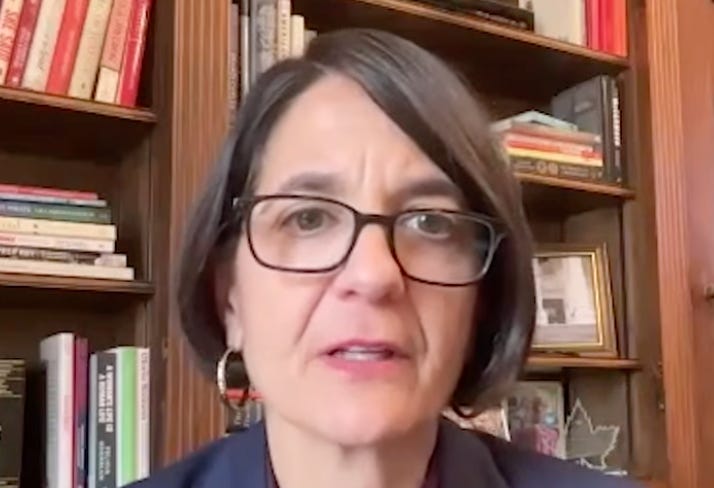Understanding the Vote: Rep. Balint, a House Resolution, and the Charlie Kirk Controversy
A breakdown of the resolution, the reasons for the controversy, why Rep. Balint voted the way she did, and how her vote differed from that of other progressives.
On Friday, September 19, 2025, Vermont’s Representative Becca Balint cast a vote that placed her at odds with many of her progressive colleagues in the U.S. House of Representatives. She voted in favor of a resolution that, on its surface, honored the life of a man named Charles “Charlie” James Kirk. However, the measure's association with the name of a prominent and controversial conservative pundit, Charlie Kirk of Turning Point USA, sparked a sharp debate among Democrats, leaving many Vermonters seeking to understand the details behind the vote.
This explainer breaks down the resolution, the reasons for the controversy, why Rep. Balint voted the way she did, and how her vote differed from that of other progressives.
What Was the Vote About?
The vote was on House Resolution 719, a measure introduced to honor the life of a different Charles “Charlie” James Kirk, a local community figure and union member from Illinois who was tragically killed in an act of political violence.
The resolution had two main purposes:
To “honor the life and legacy” of this specific individual.
To condemn “political violence in all its forms” and reaffirm the importance of peaceful debate.
The measure was brought to the floor for a vote and ultimately passed the House with broad bipartisan support, 351-68. The confusion over the name, however, became the central point of contention for a significant number of lawmakers.
Why Was the Vote Controversial?
The controversy stemmed entirely from the name "Charlie Kirk." The resolution was not about the nationally known political commentator Charlie Kirk, the founder of the conservative youth organization Turning Point USA.
This Charlie Kirk is a highly polarizing figure known for his provocative and often inflammatory rhetoric. He and his organization have been criticized for statements targeting immigrants, promoting election conspiracy theories, and downplaying the severity of the January 6th Capitol attack. According to a report from The Guardian, his commentary has been described by critics as spreading "hateful rhetoric and division."
Because of the pundit's reputation, dozens of Democratic members, particularly progressives, felt they could not vote for any resolution bearing the name "Charlie Kirk," fearing it would be misinterpreted or used for political purposes by their opponents. They argued that voting "yes" could create the appearance of honoring the conservative pundit, regardless of the resolution's actual text.
How Rep. Balint Voted and Why
Representative Becca Balint was one of 144 Democrats who voted "Yes" on the resolution.
In a statement released from her office shortly after the vote, Rep. Balint explained her decision was rooted in the resolution's core message against political violence.
“Let me be clear, I find the rhetoric from Charlie Kirk and Turning Point USA to be dangerous and reprehensible,” Balint stated. “But this resolution was not about him. It was about honoring a union member from Illinois who was a victim of a horrific act of political violence. My vote was to condemn this violence and stand in solidarity with the victim’s family.”
Balint emphasized that her vote was a matter of principle, intended to send a clear message that violence has no place in political discourse. She framed her decision as one of separating the condemnation of a violent act from the unfortunate name association that caused the controversy.
The Split Among Progressives
The final vote, recorded in the official House roll call, reveals a significant divide within the Democratic party and specifically within the Congressional Progressive Caucus, of which Balint is a member.
A total of 68 Democrats voted "No," including prominent progressives such as Representatives Alexandria Ocasio-Cortez of New York, Ilhan Omar of Minnesota, and Pramila Jayapal of Washington, who chairs the caucus. Their opposition was based on the argument that the potential for confusion and the symbolic association with the conservative pundit were too great to ignore. They did not want to legitimize the name in any official capacity.
However, Rep. Balint was not alone among her progressive colleagues in voting "yes." Representative Jamie Raskin of Maryland, a fellow caucus member and respected constitutional law expert, also voted in favor. In a statement, Raskin echoed Balint's reasoning, saying, "We must be able to condemn political murder and terrorism without allowing ourselves to be distracted by toxic political personalities who want to insert themselves into every story." Their shared position highlights a tactical disagreement among progressives: whether to vote based on the literal text and intent of a resolution or on its potential political interpretation and symbolism.
What Happens Next
With the passage of H.Res. 719, the House has officially gone on record honoring the late Charles "Charlie" James Kirk of Illinois and condemning political violence. The resolution itself does not have the force of law and requires no further action from the Senate or the President.
For Vermonters, the focus now turns to the political implications of Rep. Balint's vote. Her decision to break with many in her caucus demonstrates a willingness to vote on the specific language of a measure, even when it carries political risk. This vote will likely become a data point for constituents evaluating her approach to legislating—whether they see it as a principled stand for civility or a misjudgment of the political landscape.
The debate over the resolution also reflects a larger, ongoing struggle within American politics: how to address rising political tensions and violence while navigating a deeply polarized and often misleading information environment. For Rep. Balint and her colleagues, this vote is over, but the challenge it represents will continue.




Thank you clearing up this misunderstanding. I will share it with fellow Vermonters who may not have heard this.